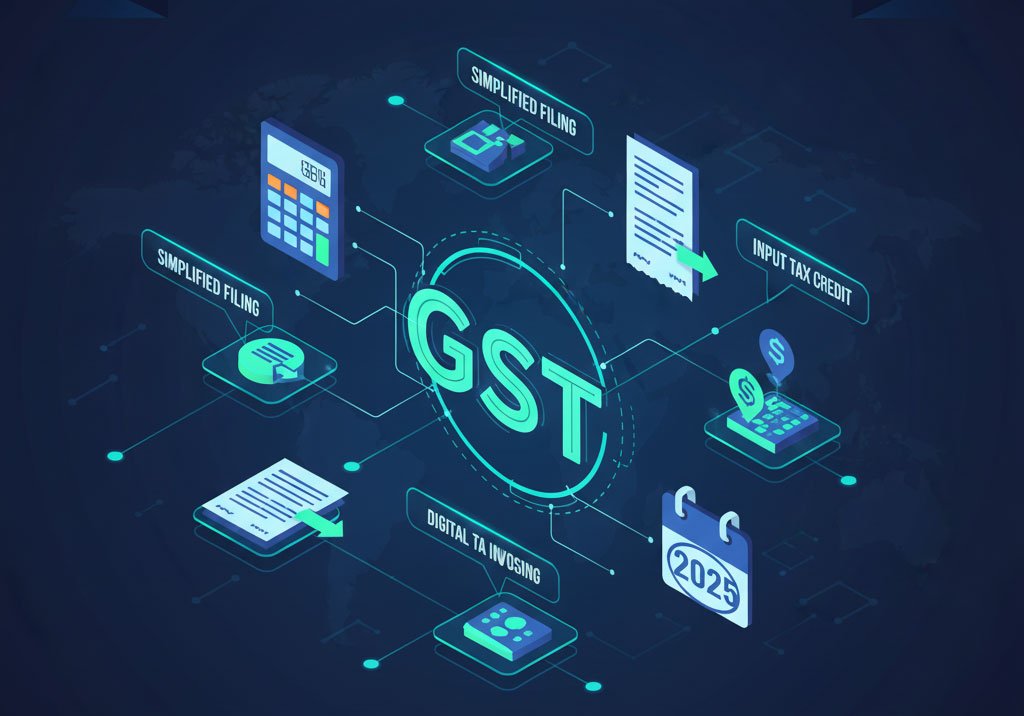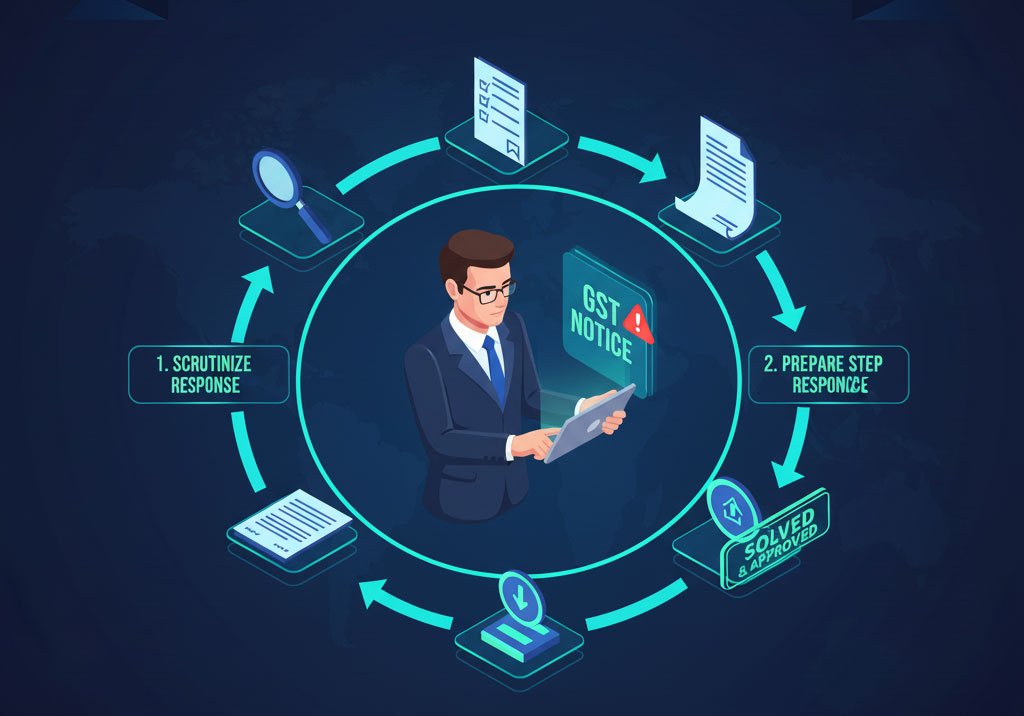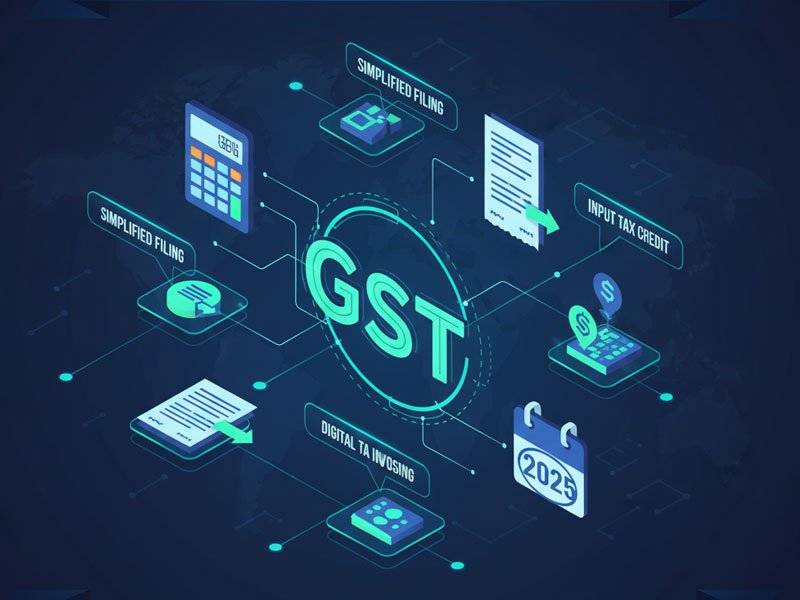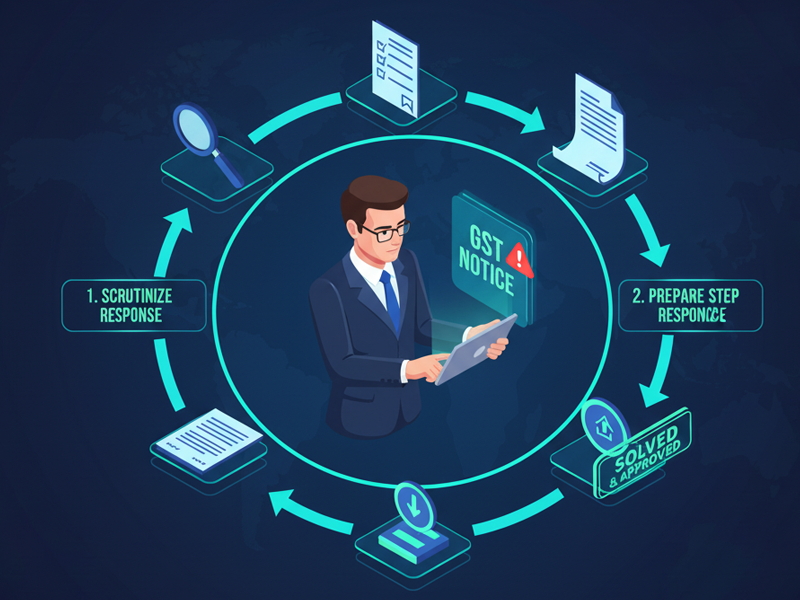- Home
- GST Updates
GST Updates

Latest GST Reforms Explained: What Every Business Should Know in 2025
Goods and Services Tax (GST) continues to evolve, aiming to simplify tax compliance while ensuring better revenue management for the government. As a business owner, staying updated with the latest GST reforms is crucial to avoid penalties, optimize your tax structure, and enhance operational efficiency. In this article, we break down the recent changes and their implications for businesses across sectors.
Key Reforms in 2025
E-invoicing Extended to More Businesses
The government has extended mandatory e-invoicing thresholds to cover businesses with turnover above ₹5 crore. This ensures greater transparency and real-time tracking of transactions.
New Rate Rationalization Framework
Several products and services have seen adjustments in tax rates, especially in sectors like logistics, digital services, and eco-friendly products. Businesses need to reassess pricing strategies and contracts accordingly.
Stricter Compliance for Input Tax Credit (ITC)
Input Tax Credit claims are now subject to stricter verification processes. Businesses must ensure that invoices, GST returns, and payments are aligned to avoid claim rejections.
Automated Risk Assessment Tools
The government has introduced automated risk analysis tools for quicker audits and scrutiny. Timely reconciliation between GSTR-1 and GSTR-3B filings is now essential.
Facilitating MSMEs with Simplified Returns
Micro, small, and medium enterprises (MSMEs) can benefit from quarterly returns and reduced documentation requirements, promoting ease of doing business.
Impact on Businesses
- Increased compliance requirements but better integration of tax data.
- Enhanced transparency, which helps in combating tax evasion.
- Need for updated accounting software and staff training.
- Potential cash flow challenges due to delayed ITC or compliance gaps.
How The GST Lawyer Can Help
Our team specializes in GST & Indirect Taxation and helps you navigate reforms with expert advice, compliance reviews, and audit support. We assist in seamless transition with customized tax planning and documentation strategies.

How to Handle a GST Notice in 2025: A Step-by-Step Guide for Businesses
Receiving a GST notice can be alarming, but it’s not the end of the road. Notices are a normal part of the government’s compliance framework, often arising due to mismatches in filings, delayed payments, or documentation gaps. If handled properly, most notices can be resolved without major disruptions.
Types of GST Notices Commonly Issued in 2025
Mismatch in Input Tax Credit (ITC)
Notices arise when claimed ITC doesn't align with supplier invoices or payments.
Delayed or Non-filing of Returns
Automated alerts are sent if GSTR-1, GSTR-3B, or annual returns are missing or incomplete.
High-Value Transactions
Sudden spikes in transaction values without adequate documentation can trigger scrutiny.
Refund Rejections
Incorrect invoice matching or incomplete data may result in refund queries.
Steps to Handle a GST Notice
Carefully Review the Notice
Understand the reference period, nature of discrepancy, and documents required.
Verify Records
Cross-check GST returns, invoices, purchase orders, and payments to identify errors.
Respond Within Time
Timely response avoids penalties and interest charges. Late replies may escalate the issue.
Prepare Supporting Documents
Ensure invoices, bank statements, and reconciliations are accurate and verifiable.
Engage a Tax Professional
Expert review helps frame responses in compliance with law and prevents future disputes.
Appeal if Necessary If you disagree with the notice, you can file an appeal with proper grounds under the GST framework.
Common Mistakes to Avoid
- Ignoring notices thinking they’re routine.
- Filing incomplete or incorrect responses.
- Not maintaining proper records of transactions.
How The GST Lawyer Supports You
With our expertise in GST & Indirect Taxation, we offer end-to-end support—reviewing notices, preparing documentation, advising on corrective filings, and representing you before tax authorities. We ensure that your response is legally sound and timely.

Top Compliance Mistakes Businesses Must Avoid in 2025: Stay Ahead with Expert Guidance
Compliance is the backbone of smooth business operations under GST, Income Tax, and Commercial Laws. However, many businesses, especially startups and SMEs, make preventable mistakes that can lead to penalties, cash flow disruptions, and legal complications. Here are the top compliance pitfalls to avoid—and how professional support can safeguard your business.
Common Compliance Mistakes in 2025
Failure to Reconcile Invoices with GST Returns Many businesses overlook proper reconciliation, leading to mismatch notices and denial of Input Tax Credit.
Incorrect Classification of Goods and Services Wrong HSN codes or service descriptions can result in wrong tax rates and subsequent penalties.
Delayed Return Filing Ignoring deadlines for GSTR-1, GSTR-3B, or annual filings creates compounding penalties and interest liabilities.
Improper Documentation for Refunds Lack of proper invoice attachments or missing payment proofs delays claim settlements.
Ignoring Advance Rulings or Clarifications Businesses often neglect available channels to clarify tax liabilities, leading to disputes during audits.
Not Keeping Separate Books for Different Tax Purposes Mixing personal and business accounts or improper expense categorization creates red flags.
Neglecting Cross-border Tax Compliance For exporters and importers, failing to document reverse charge mechanism, LUT, or customs duties accurately results in scrutiny.
How These Mistakes Impact Your Business
- Financial penalties and interest accruals.
- Blocked or delayed refunds.
- Increased scrutiny during audits.
- Operational disruptions and reputational damage.
Best Practices for Compliance
- Maintain accurate invoicing and payment records.
- Automate reconciliation processes using updated accounting tools.
- Review return filings before submission.
- Seek expert advice in ambiguous areas.
- Stay informed about legislative changes and rulings.
How The GST Lawyer Can Assist You
Our expertise spans GST & Indirect Taxation, Income Tax, and Commercial Laws. We offer tailored solutions including compliance audits, advisory services, tax structuring, and dispute resolution. Our goal is to ensure your business stays compliant, reduces risks, and grows sustainably.


